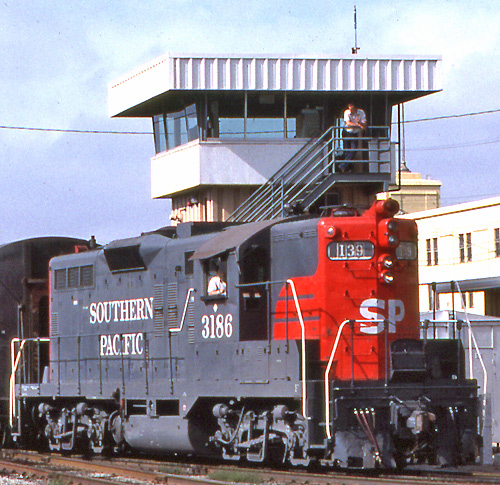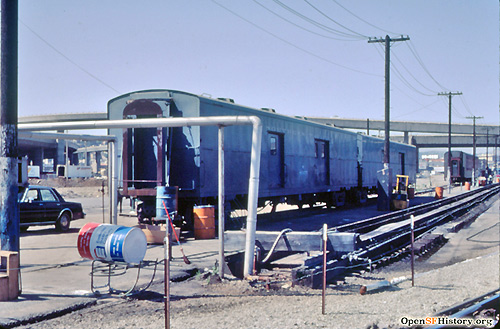One day in the mid-1990's, I drew the daylight shift yard engine at Caltrain's San Francisco depot, not a bad gig. Among the crew's duties was to spot trains on The Pullman, the two tracks in the photo, for the carmen to inspect / repair from underneath. As the picture shows, the rails were supported by - rather than ties - longitudinal stringers that I estimate were maybe 14"x14". When I (OK, actually my engine) shoved my train into the vacant track at right, nothing unusual happened until we stopped.
Then, within a second, or two, I suddenly felt my engine lurch/lean sideways to the left, followed by a thud and an equally sudden, more precarious lean to the right. The short of it is that stringers on both sides were hollowed out by rot and had imploded, left side followed by right, resulting in my engine settling in a position barely short of toppling over.
I suppose that a common initial reaction to any accident is a spinning up of mental processes, which certainly was true in my case: I estimate that I began laughing myself to tears within milliseconds. Of course it could be argued that this was a very unprofessional response.
The thing is, once you have been around the block a couple of times, you realize that trains and engines stub their toes all the time. About 99% of the results are no worse than what I had experienced here. Where personal professionalism did enter the picture was during those intervening milliseconds between CLUNK and HA! Within that whisp of time I somehow completed the most pressing question that a seasoned rail would and should ask in a less-than-life-or-death situation: I am going to be fired (suspended) over this? Somehow I intuitively knew without thinking that it was highly unlikely that I would be charged with derailing a motionless engine. I am still proud of this rapid response, but at the same time now wonder when the mental quickness went away. These days I worry that if a "Senior" version of Jeopardy! were to appear on TV, I still would be unable to conjure up answers in time.
Continuing the narrative: According to the Amtrak emergency response manual, copies of which were only supplied to managers, I should have immediately notified San Jose Control (dispatcher) over the radio with something akin to this, "Emergency, emergency, emergency! San Jose Control, the City Yard Job has just derailed its engine on The Pullman! Should I check for injuries and possible fire? Over!" While this might not be the exact proscribed verbiage, the primary reason to call the dispatcher so that all decision making would be usurped from on site in favor of rote directions from the manual recited by a kid half my age. This sort of thing constantly grated on we ex-Southern Pacific guys who were used to dealing directly with a predicament - largely because our crappy Motorola radios were better suited as fishing weights.
But screaming Emergency! over the radio per SOP seemed to be overkill, as it would to anyone outside of management. Besides, I had a plan of my own that would not only handle the matter, but also cause me to score style points against my long-time nemesis, Road Foreman of Engines Will Hastings. Will had a knack for getting under people's skins, in contrast to his amiable predecessor, Gentleman Bob Peterson.
I was quite aware that Will was over in his office, a former control tower about 200 feet directly across the tracks. He had a reputation for staring out the tower window through a pair of binoculars in the hopes of spotting a rules infraction. This was a constant source of fun for me, because he never caught on that I was constantly going out of my way to visually jerk his chain.

Fourth St. Tower's interlocking operator rolls by a plug in 1986. Adecade later, Will would occupy the spot.
So, what to do, but call Will instead of the dispatcher. I was a little surprised that he had put down his binocs long enough to miss the show, but no matter. I radioed, "Hello Will? Will, are you there? This is the yard job calling. We have a little problem."
Will normally was a rodger-dodger enforcer of radio procedure, but in this case, he inadvertantly lowered his guard. "Yeah Ed, [sigh], what is it?" His slip in radio procedure, I noted, was an immediate tactical victory for me in our ongoing war of, well, Wills.
"Will, my engine fell off the track after we were stopped over here on The Pullman."
Will: "WHAT!!?? Would you repeat that?"
"While we were sitting still, the engine just fell off the track. It is listing pretty badly. I hit the fuel cutoff just in case it rolls over, over."
In an instant, he was on scene, wringing his hands over the disaster. Even a guy like Will could not figure out how blame me for wrecking an engine that was standing still, so I suddnly found myself shuffled out of the picture. I had nothing left to do except fill out an accident report. This I did over coffee and a bearclaw at the nearby donut shop.
In retrospection, beyond being unique (?) in the annals of railroading, this probably was the defining moment of my career.

